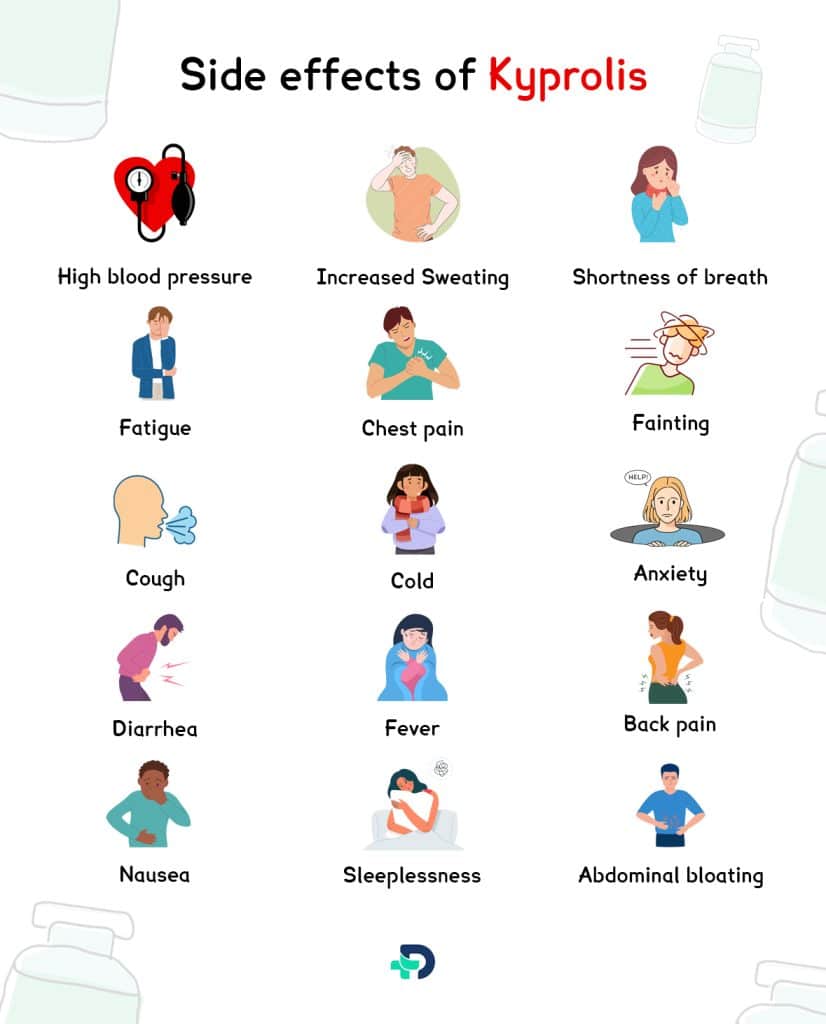Kyprolis: Uses, Dosage, Side effects and Interactions

- Kyprolis
- 22 Aug 2023
Overview
What is Kyprolis?
Kyprolis is a brand-name prescription for the medication carfilzomib. As it targets fewer bodily cells and has different or fewer adverse effects than chemotherapy medications, Kyprolis is regarded as a targeted therapy rather than a chemotherapy drug.1Overview| Researched based study from Cancerresearchuk.org Kyprolis, approved by the US Food and Drug Administration (FDA) in 2012,2Overview| Researched based study from Cancer.gov has demonstrated outstanding efficacy in managing this aggressive disease that affects bone marrow plasma cells.
This article explores its mechanism of action, applications, dosage, administration, storage, contraindications, adverse effects, warnings, dangers, and medication interactions.

How does Kyprolis work?
- Kyprolis is a member of the drug class known as proteasome inhibitors, which function by targeting on the cancer cells’ proteasomes3Overview| Researched based study from Medlineplus.gov
- By inhibiting these proteasomes, Kyprolis causes cell death in cancer cells, effectively slowing the formation of tumors by impacting all cells that divide quickly4Overview| Researched based study from Kyprolis.com
Uses
Uses of Kyprolis
Adult patients with relapsed or resistant multiple myeloma are treated with Kyprolis.5Uses| Researched based study from Fda.gov
In Combined therapy of Multiple myeloma
If they have previously undergone one to three lines of therapy, they should be combined with one of the following drugs:
- Dexamethasone
- Dexamethasone with lenalidomide
- Dexamethasone with daratumumab.
- Daratumumab combined with dexamethasone and hyaluronidase-fish.
- Dexamethasone with Isatuximab
As a sole therapy of multiple myeloma
- For individuals who have already undergone one or more lines of therapy, by itself as a single agent.
Dosage
Dosage of Kyprolis
Recommended Dosage
- The dosage of Kyprolis varies based on the patient’s body surface area and medical history.
- It is typically given once or twice weekly in combination with other drugs6Dosage| Researched based study from Dailymed.nlm.nih.gov
- The doctor may modify the dosages based on the individual’s health conditions and tolerance.
Dosage Strength
Three concentrations of powdered Kyprolis are available in single-dose vials:
- 10 mg.
- 30 mg.
- 60 mg. (5)
Administration
- A healthcare professional usually administers Kyprolis as an IV infusion after mixing it with fluids.
- An IV infusion involves the medicine being infused into the patient’s vein over time.
- Hydrate patients before and after administration with oral and IV fluids7Dosage| Researched based study from Kyprolis-hcp.com
Storage
Storage
- Kyprolis vials that have not been opened should be kept in a refrigerator between 20 and 80 Celsius (360 and 460 Fahrenheit)5Storage| Researched based study from Fda.gov
- Store it in the original packaging away from light, kids and pets.
Side effects

Kyprolis Side effects
Like many medications, Kyprolis has potential adverse side effects. Typical negative consequences include:
- Fatigue
- Cough
- Fever
- Nausea 5Side effects| Researched based study from Fda.gov
- Anxiety
- Diarrhea
- Pale skin
- Back pain
- Headache
- Constipation
- Stomach pain
- Sleeplessness
- Increased Sweating
- Runny or Stuffed nose
- Facial pain or pressure
- Shortness of breath
- High blood pressure
However, patients should be aware of more severe side effects such as
- Hoarseness of voice
- Breathlessness with exertion 8Side effects| Researched based study from Healthdirect.org.au
- Abdominal bloating
- Rapid heartbeat
- Palpitation
- Chest pain
- Confusion
- Lightheadedness
- Fainting
- Loss of appetite
- Seizures
- Blurred vision
- Loss of vision
- Slurred speech
- Difficulty swallowing
- Easy bleeding or bruising
- Black or red stool
- Facial flushing
- Swelling of hands, feet, or ankles
- Little or no urine
- Severe abdominal pain (right side)
- Coughing up blood
- Vomiting blood 8Side effects| Researched based study from Healthdirect.org.au
- Loss of consciousness
- Cold, clammy skin
For prompt intervention, it is essential to inform the healthcare professional right once of any negative responses.
Contraindications
Contraindications
- Hypersensitivity – For patients who have experienced severe hypersensitivity responses to carfilzomib or any of its ingredients in the past, Kyprolis is not advised.9Contraindications| Researched based study from Medsafe.govt.nz
- Pregnant or breastfeeding individuals – pregnant or nursing women should not use Kyprolis since it could harm the unborn child or newborn1Contraindications| Researched based study from Cancerresearchuk.org
Precautions
Risks & Precautions
Patients must fully reveal their medical history to the healthcare professional before beginning Kyprolis treatment, including any underlying diseases and prior drug sensitivities:
- Infusion-related Reactions – There have been reactions to infusions like fever, joint pain, chills, body ache, facial flushing, swelling of throat, facial swelling, vomiting, syncope, shortness of breath, weakness, low blood pressure, angina, or tightness in the chest. These effects might happen right away or up to 24 hours after ingestion. Pre-medicate with dexamethasone to minimize the occurrence and severity of infusion-related responses10Precautions| Researched based study from Oncolink.org
- Tumor lysis syndrome (TLS) – Patients should be adequately hydrated before starting Kyprolis medication. They should also be swiftly treated, and their uric acid levels should be checked regularly as there is a risk of developing tumor lysis syndrome.
- Heart toxicities – are a concern associated with using Kyprolis. When patients exhibit indications of heart failure or ischemia, Kyprolis treatment should be discontinued, and they should be appropriately assessed.
- Acute kidney failure – People with kidney disease or failure should have their serum creatinine levels and creatinine clearance level tested often.
- Pulmonary toxicity – such as acute respiratory failure, acute respiratory distress syndrome, and acute diffuse infiltrative pulmonary disease, can result from this medication. So, it should be stopped, and the patient should be assessed immediately.
- Breathlessness – Kyprolis should be stopped if patients begin to exhibit symptoms like breathlessness, and they should be assessed.
- Venous thrombosis – Some patients on Kyprolis reported experiencing pulmonary embolism and deep venous thrombosis. It’s advised to practice thromboprophylaxis.
- High blood pressure – There have been fatal cases of Hypertension, including hypertensive emergencies and crises. Before taking Kyprolis, manage your blood pressure. Every patient should undergo routine blood pressure checks. Stop Kyprolis and evaluate if your Hypertension cannot be appropriately controlled.
- Pulmonary Hypertension – patients on Kyprolis should be evaluated with cardiac imaging or additional procedures as necessary. It should be stopped until the problem gets resolved, then decide whether to continue based on a benefit & risk analysis.
- Thrombocytopenia – Kyprolis can induce thrombocytopenia, which usually returns to normal by the beginning of the next cycle. During treatment, check your platelet counts often. As necessary, lower or hold the dose. Keep track of platelet counts; stop or lower Kyprolis dosage as a doctor prescribes.
- Thrombotic Microangiopathy – Keep an eye out for symptoms and indicators. If there is suspicion, stop taking Kyprolis.
- Liver toxicity and liver failure – Kyprolis can increase serum transaminases. Regardless of baseline readings, regularly check liver enzyme levels. As necessary, lower or hold the dose.
- Posterior Reversible Encephalopathy Syndrome (PRES) – If you notice any new neurological or visual issues, you should consider getting an MRI. If you suspect PRES, stop taking Kyprolis.
- Toxicities in Transplant-Ineligible Patients – Kyprolis Melphalan and Prednisolone should not be used simultaneously in patients with newly diagnosed multiple myeloma who are not transplant candidates.
- Bleeding – Serious or fatal bleeding incidents have been documented. There have been incidents of bleeding in the lungs, nose, gastrointestinal tract, or into the skull. The dosage should be decreased or terminated after the patient is promptly checked for any signs and symptoms of blood loss5Precautions| Researched based study from Fda.gov
- Progressive multifocal leukoencephalopathy (PML) – Consider PML if there are any new or worsening neurologic symptoms. Kyprolis should be stopped in patients who have PML.
- Embryo-Fetal Toxicity – Kyprolis may affect developing fetuses. Men with female partners who are sexually active should be warned about the risk to an unborn child and encouraged to use reliable contraception.
- Drowsiness – Inform patients that taking Kyprolis may result in tiredness, fainting, dizziness, and reduced blood pressure. If patients exhibit these symptoms, advise them not to drive or use machinery5Precautions| Researched based study from Fda.gov
Interactions
Kyprolis Drug interactions
Kyprolis may interact with:
- Oral contraceptives – Kyprolis users who use hormonal contraception run the risk of developing thrombosis. As a result, people ought to think about using another reliable means of contraception while receiving treatment.
Before starting Kyprolis, patients are recommended to review all of their existing prescriptions with their doctors in order to prevent any potential drug interactions. This covers prescription, nonprescription, herbal, and dietary supplements.
Any feedback on this article?
 This Articles content was accurate
This Articles content was accurate Very Informative Article
Very Informative Article I have a question or a comment
I have a question or a comment
 This article contains inaccurate content
This article contains inaccurate content This article was not helpful
This article was not helpful I have a question or a comment
I have a question or a comment
We appreciate your helpful feedback!
Checkout our social pages
References
-
Cancer Research UK
Carfilzomib and dexamethasone | Overview
-
National Cancer Institute
FDA Approves Expanded Indication for Carfilzomib in Patients with Multiple Myeloma | Overview
-
Medline Plus
Carfilzomib Injection | Overview
-
Amgen Inc
Kyprolis | Overview
-
FOOD AND DRUG ADMINISTRATION
KYPROLIS® | Uses | Precautions
-
Dailymed
KYPROLIS- carfilzomib injection, powder, lyophilized, for solution | Dosage
-
Amgen Inc
KYPROLIS | Dosage
-
Health direct
KYPROLIS | Side effects
-
MEDSAFE
KYPROLIS | Contraindications
-
Oncolink
Carfilzomib (Kyprolis®) | Precautions





































